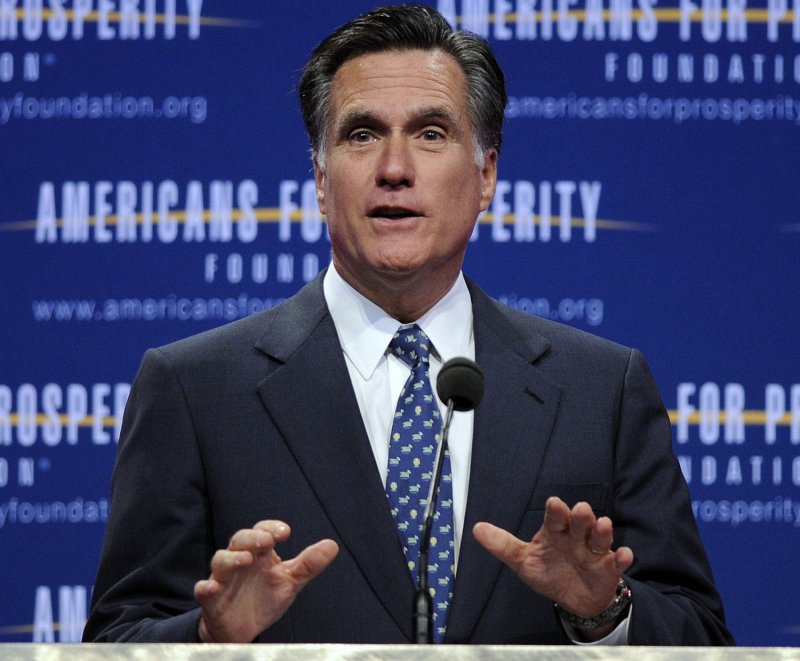1 of 3 | Republican presidential candidate former Gov. Mitt Romney speaks to an Americans for Prosperity (AFP) Foundation summit in Washington on November 4, 2011. UPI/Roger L. Wollenberg |
License Photo
The 2012 election cycle is kinda-sorta breaking the time-honored American adage of not discussing religion and politics in the same sentence
Kinda-sorta because two men seeking the Republican presidential nomination are members of the Church of Jesus Christ of Latter-day Saints, commonly called the Mormons. Faith in broad terms is discussed; specific religions generally are not.
Former Massachusetts Gov. Mitt Romney, who sought the party's nod four years ago, tried to allay voter concerns during the 2008 campaign about his Mormon faith influencing a Romney White House, saying: "If I am fortunate to become your president, I will serve no one religion. A president must serve only the common cause of the people of the United States."
Should questions on religion now come up on the stump, Romney talks about faith in general, not specifics of his faith.
But the undercurrent is there.
Uneasiness about religion is nothing new in politics. Mormonism founder Joseph Smith was assassinated after he announced he was seeking the presidency in the 1840s. In the 1960s, John F. Kennedy's presidential bid was met in some quarters by fear that the Vatican would rule the White House because Kennedy was Catholic. In 2008, many people wondered aloud if President Obama, a Christian, was Muslim, even as they took him to task for attending church where a controversial minister preached incendiary rhetoric.
The Mormon church claims to be the restoration of Jesus Christ's original church. The Latter-day Saints have a living prophet, 12 apostles and believe in the Bible, Book of Mormon, and Doctrine & Covenants as holy scriptures. The center of Mormon cultural influence is in Utah.
Most Americans still see the Mormon faith as unfamiliar and different, a recent poll by the Pew Research Center indicated. About half said they know little or nothing about the Christian denomination. Half say it's a Christian faith while a third say it isn't. About two-thirds said they think Mormon tenets are "very different" from their own beliefs.
About 60 percent of evangelical Republicans know Romney is a Mormon, Pew said. And white evangelical Protestants are more inclined than the public in general to view Mormonism as a non-Christian faith.
Because of this, Romney's religion has implications for his nomination, but not necessarily for the general election if he is chosen his party's standard-bearer over a field that includes former Utah Gov. Jon Huntsman, also a Mormon. Once the general election is in full swing, Republicans of all religious stripes indicated they would back Romney -- again, if nominated -- in a run against Obama.
Romney's team "is hoping born-again Christians are less worried about a church than they are about their checkbook," said Adam Christing, an expert on Mormon history and writer/director of the documentary "A Mormon President: Joseph Smith and the Mormon Quest for the White House." "When you are agonizing in pain, you don't care what their religion is. You just want to stop the pain."
A candidate's faith has a place in politics because it provides voters a glimpse into a candidate's character, Christing said.
"You can't separate someone's beliefs from who they are," he said, "But I also don't think they should be penalized for their beliefs."
While a candidate can't separate beliefs from his or her identity, Christing said Romney "isn't running for pastor; he's running for president."
Christing said he's noticed a toning down of the anti-Mormon sentiment, but it's still there. One of the most prominent attacks against Romney and Mormon followers occurred when the Rev. Robert Jeffress of First Baptist Church of Dallas, a supporter of GOP presidential hopeful and Texas Gov. Rick Perry, said Romney is "not a real Christian" and called the Church of Jesus Christ of Latter-day Saints a "theological cult."
"'Cult' is such a loaded word," Christing said.
Still, the rhetoric has lessened.
"It's not quite as intense because we've already gone through it," Christing said. "It's still the ghost in the room [and] still a big factor, but nowhere near what it was 2008."
Romney has been at or near the top of GOP presidential polls for months, but political analysts say his religion may cost him some votes, particularly among evangelical Christians. Huntsman, on the other hand, has been in the second tier of candidates and is struggling.
An October Iowa Poll indicated just 9 percent of evangelical Christians supported Romney, placing him in a fourth-place tie with former U.S. Sen. Rick Santorum of Pennsylvania among evangelicals, a potent wing of Iowa Republicans, The Des Moines Register reported.
"That faction of the Republican Party has a very narrow view of what America looks like, and Mormons don't fit that view," said Dennis Goldford, a Drake University professor of political science. "The question is how deep that goes. Evangelicals are not going to vote for Obama, but will they sit on their hands if the alternative is Romney?"
The Church of Jesus Christ of Latter-day Saints has a long history of being misunderstood and mistrusted by others.
Smith built the largest American-born religion in 1830 based on visions he believed God revealed to him. In 1844, after he announced his presidential candidacy, a mob in Illinois killed Smith and his brother.
The church was -- and is -- secretive, Christing said, although it has become more open and has reached out to form alliances with other faiths on specific issues.
"When the church stays focused on values, it shares common ground with other religions," he said.
Win or lose now or in November, Romney helped bring Mormonism into the mainstream, Christing said.
"With Obama, we now can say, 'Yes, we can elect another black president," he said. "Whether he [Romney] wins or not, we've moved so far from 'It's impossible; it's not going to happen.'"















